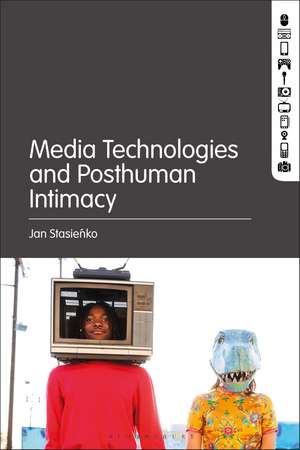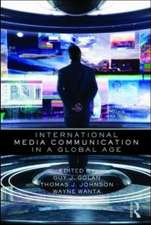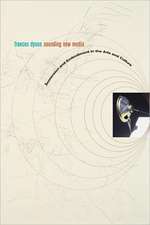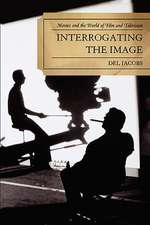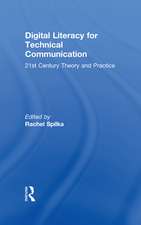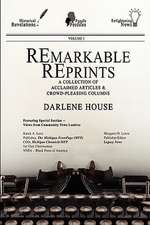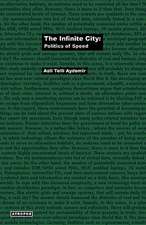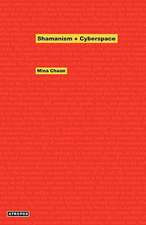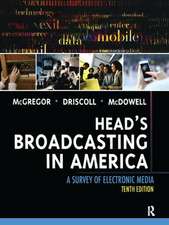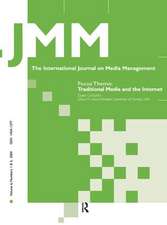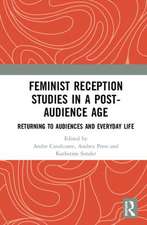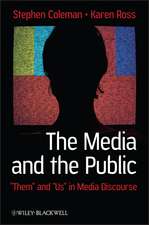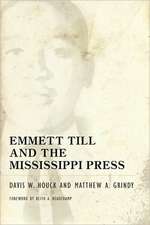Media Technologies and Posthuman Intimacy
Autor Jan Stasienkoen Limba Engleză Paperback – 28 iun 2023
| Toate formatele și edițiile | Preț | Express |
|---|---|---|
| Paperback (1) | 192.73 lei 6-8 săpt. | |
| Bloomsbury Publishing – 28 iun 2023 | 192.73 lei 6-8 săpt. | |
| Hardback (1) | 599.82 lei 3-5 săpt. | |
| Bloomsbury Publishing – 15 dec 2021 | 599.82 lei 3-5 săpt. |
Preț: 192.73 lei
Preț vechi: 250.11 lei
-23% Nou
Puncte Express: 289
Preț estimativ în valută:
36.88€ • 38.78$ • 30.47£
36.88€ • 38.78$ • 30.47£
Carte tipărită la comandă
Livrare economică 16-30 aprilie
Preluare comenzi: 021 569.72.76
Specificații
ISBN-13: 9781501380556
ISBN-10: 1501380559
Pagini: 304
Ilustrații: 43 illus
Dimensiuni: 152 x 229 x 25 mm
Greutate: 0.41 kg
Editura: Bloomsbury Publishing
Colecția Bloomsbury Academic
Locul publicării:New York, United States
ISBN-10: 1501380559
Pagini: 304
Ilustrații: 43 illus
Dimensiuni: 152 x 229 x 25 mm
Greutate: 0.41 kg
Editura: Bloomsbury Publishing
Colecția Bloomsbury Academic
Locul publicării:New York, United States
Caracteristici
Covers significant case studies of posthuman intimacies: marriages with objects, "The Sims" game portrayed as a concentration camp, close relations between animators and their characters, erotic websites as non-human data bases
Notă biografică
Jan Stasienko is a full professor and Director of Research at the Department of Media and Communication, University of Lower Silesia, Poland, and founding Director of the Digital Masters: Centre for Games and Animation, ULS, Poland. He has been a visiting scholar in the Department of Communication, SUNY College at Brockport, USA and Centre for Digital Media, Vancouver, Canada.
Cuprins
IntroductionI. Cinematic Intimacies1."Kaleidoscope of Jouissance": The Erotic Peepshow as a Game on Subjectivity.2.Classic Animation and the Origins of Intersubjective Intimacy3.Cinema-Cyborg and Human-Layer Digital Cinema Technologies as Vehicles of PosthumanismII. Tele-visions4.Tele-prompter and Posthuman Repositioning of the Gaze5.Posthumanism Through Interaction: Intimacies, Staring and Collective Creations in "Winky Dink & You"6.Phone-in Television Quizzes as Vehicles of Deep DigitizationIII. Digital Encounters:7.BeautifulAgony.com and the Eroticism of the Database8.Bridegrooms of Pixels, Concrete and Steel: The Wedding Ceremony as an Act of Subject Funding9."The Sims" and Defining Subject through CrueltyConclusionsBibliographyIndex
Recenzii
Stasienko takes media studies into a journey to their roots in the humanities, only to realize they have always been posthuman.
This is an extraordinary book based on questions that still sound strange for a lot of us in the present cultural context and among the common academic research fields. "Is it possible to place our feelings in algorithms, digital representations, images and sounds?" and "who or what is the non-human other situated in the media apparatus?" are two of the many thrilling hypotheses raised by the author. Jan Stasienko is discussing with us "the scope of possibility of building subjective relations between the users of the various media technologies and the senses communicated through the latter." Stasienko is actually creating a theory of intimacy processes between human subjects and computer programs, discussing, mainly from the perspective of posthumanism, what kind of relation could it be, as well as the boundaries between pleasure and violence in doing so. Are we altered by the mechanical 'other'? Or we just need new, posthuman, ontologies? All these amazing things are openly discussed here, in an academic book that at the same time can work as a coursebook and as breathtaking science fiction. I have enjoyed it very much!
In this theoretically rich and multidisciplinary study, Jan Stasienko visits various eras and environments of traditional and digital media to find and draw a map of posthuman intimacy built in media apparatuses. Stasienko carefully tracks how and when our existence becomes posthuman by entering various technological realms to look at how our corporeality, sexuality and intimacy are radically reconfigured in these historical and contemporary spaces. The desire to show the profound complexity of the human-information relations coincides here with the ability to build an engaging narrative about what it is like to love and hate codes and meanings shaped in the form of avatars, cartoon characters, CGI personas or immaterial objects of sexual desire.
This is an extraordinary book based on questions that still sound strange for a lot of us in the present cultural context and among the common academic research fields. "Is it possible to place our feelings in algorithms, digital representations, images and sounds?" and "who or what is the non-human other situated in the media apparatus?" are two of the many thrilling hypotheses raised by the author. Jan Stasienko is discussing with us "the scope of possibility of building subjective relations between the users of the various media technologies and the senses communicated through the latter." Stasienko is actually creating a theory of intimacy processes between human subjects and computer programs, discussing, mainly from the perspective of posthumanism, what kind of relation could it be, as well as the boundaries between pleasure and violence in doing so. Are we altered by the mechanical 'other'? Or we just need new, posthuman, ontologies? All these amazing things are openly discussed here, in an academic book that at the same time can work as a coursebook and as breathtaking science fiction. I have enjoyed it very much!
In this theoretically rich and multidisciplinary study, Jan Stasienko visits various eras and environments of traditional and digital media to find and draw a map of posthuman intimacy built in media apparatuses. Stasienko carefully tracks how and when our existence becomes posthuman by entering various technological realms to look at how our corporeality, sexuality and intimacy are radically reconfigured in these historical and contemporary spaces. The desire to show the profound complexity of the human-information relations coincides here with the ability to build an engaging narrative about what it is like to love and hate codes and meanings shaped in the form of avatars, cartoon characters, CGI personas or immaterial objects of sexual desire.
